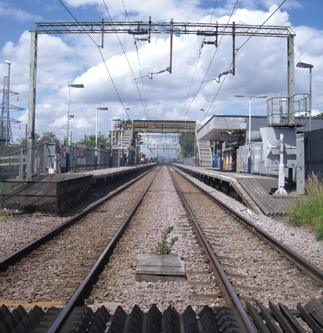Although the number of passengers on the railways has fallen drastically, the threats have not gone away, British Transport Police (BTP) chief constable Paul Crowther told the International Security Week on the first morning of the four day event. It’s running online instead of the usual pre-pandemic physical event in London.
On covid, Mr Crowther – a 40-year policeman – said that those seeking to do harm will exploit uncertainty, and complacency; ‘and, sadly, they are very good at exploiting new attack methodologies’. Though lockdowns have meant far fewer travellers by rail, crime, calls for police services, suicides on the network – source of a large amount of work for the BTP – and people detained under the Mental Health Act have not fallen by as much.
While the demand for the BTP is there, that some rail and other staff have been furloughed, and there is a reluctance to put people in ‘forward facing roles’ such as at ticket barriers and checking tickets for revenue protection, what he called ‘secondary enforcement measures’ have lapsed. “And I think you have the reverse of the ‘broken windows’ theory; people become emboldened, there’s more anti-social behaviour, and a bit more violence. We need to reinstate that public control element.”
Returning to terrorism, he recalled the recent terror attack in Vienna as an example of how terrorists will exploit new ‘crowded places’. “We have to be constantly on the look-out for vulnerabilities,” he concluded.
Earlier, it was significant that when asked about the force’s priorities he replied not only in terms of safety (low crime) and security (personal safety) but of a reliable railway, whereby the trains keep running, for economic and social well-being. While terrorism is a ‘big focus’, he spoke also of general crime and disorder, robbery and knife crime, and the ‘county lines’ drug dealing that exploits young vulnerable people. Hence increasingly BTP has a role in the safeguarding of vulnerable people.
Asked about the anticipated ‘Protect’ duty – whereby after the Manchester Arena terror attack of May 2017 and Inquiry, the UK Government may require all premises to take appropriate steps to prevent terrorism, Mr Crowther described it as a positive step. In rail terms, he recalled that the railways have been largely privatised with operating companies, so that the BTP budget is paid for by the operating companies, ‘in a very complex charging model’. He said that he had a degree of sympathy for the viewpoint among some in rail that counter-terrorism was a national security activity; in other words, that rail should not pay alone for preventing terrorism on the railways.
(See separate article for the ‘Protect duty’ outlined later in the day by another speaker, Shaun Hipgrave of the OCST in the Home Office.)
Mr Crowther made the point that of the ‘very substantial funding’ that the Government puts into counter-terrorism, ‘none of it finds its way into my budget. But that isn’t to say people aren’t willing to do what they need to do, and we work really closely with the train operators, Network Rail, Transport for London; but I do think it shouldn’t be down to relationships, and it shouldn’t be down to people’s sense of duty, and I am a supporter of a statutory requirement that people who are responsible for premises should take appropriate steps to ensure the safety of people who are using them; and that has some implications for the transport system.” Although as he added, due to the pandemic, central government has stepped in to fund the railways.
As for technology, Mr Crowther spoke of potential use of artificial intelligence (AI) both for preventing people who may seek to take their own life on station platforms; and suspicious behaviour. “I have a CCTV hub in London that has access to 60,000 cameras remotely and to be able to use really effective analytics on that infrastructure would be really important.” He added that the BTP are making good progress in using some of this technology in safeguarding; ‘we are doing a lot of work with the Home Office and other police forces’, about county lines drug dealing. He suggested that data analytics and predictive analysis could be used to track the vulnerable. There was much less nervousness, he noted, about such use of data for safeguarding than even for crime prevention and counter-terrorism.
Earlier, Steve Rodhouse, director general operations at the National Crime Agency (NCA) ended with a message for the estimated 350,000 serious and organised criminals in the UK: the NCA will leave no stone unturned.










